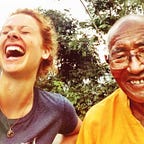You think that if you change things outside, you’ll be okay. But nobody has ever truly become okay by changing things outside. -Michael A. Singer, The Untethered Soul
Chapter 1
“Taxi! Taxi! You need taxi?”
As soon as I exit Tribhuvan International Airport, a swarm of men shout. Discombobulated and tired after two consecutive and very long flights, I gratefully spot my misspelled name on the other side of the dusty parking lot. The man holding the sign is half asleep.
I throw my hands into the air, hoping for rescue, and the man’s eyes flutter open. He helps heave my bags to his white minivan and without fanfare, we set off into the night. The dark road narrows into a one-lane alley punctured by potholes. I watch the faint outline of bricks piled on the side of the road zoom by, and candles cast shadows inside glassless, door-less storefronts.
Though at five-feet-six I am no giant, I feel like one as my head bangs repeatedly against the roof. When the van bounces to a stop, I am quick to open the door and place my feet on the ground.
“What’s that?” I point in the direction of a humming motor.
“Load shedding,” the driver replies.
Load shedding, as I learn, means blackout. While these government-controlled surges are reportedly scheduled, I have yet to see a reliable timetable. Years after I arrive in Nepal, the country is shocked to discover electricity has been corruptly monitored, with money benefiting pockets of certain individuals. But in this moment, I don’t know that.
Admittedly, in this moment, I know little about Nepal.
A fluorescent bulb dangles in the lobby of the guesthouse. The owner teaches me how to use the light switches, one for the bulb powered by the generator and the other for the hours when there is electricity.
“Tomorrow-you-have-meeting-rest,” his words are a muddled stream filling the hallway.
Desperate to rinse off the smell of stale plane air, I fumble with the metal knobs of the shower. The water is ice cold: Two minutes, five minutes, still glacial. I tiptoe downstairs to the smiling man, his head bobbing up and down. I return his greeting even though I am exhausted.
“The hot water isn’t working?” My voice is both statement and question.
“Load shedding.” He shrugs.
I retreat upstairs defeated and plunge myself beneath the chilly tap. The floor trembles as soon as I do, and shouts reverberate throughout the corridor separating this hotel and the next.
My first night in Nepal and an earthquake, the first of many to come.
Nepal.
The name alone was exotic and rugged, far away from New York City street lights and the foothills of Colorado — all places familiar to me. I had hoped that in Nepal I wouldn’t need to worry about my deteriorating relationship or any major life decisions. I craved escape, a temporary respite, and since I had little else to cling to, I clutched onto the one choice I could be certain about.
I’m going to Nepal.
“I can use the trip as a marketing stunt,” I explained to my boss. “Risk taking, adventure,” I said. I would bring our company logo to Everest Base Camp and take pictures on top of the world.
“It’ll only be two weeks,” I pleaded, asking for time off. I yearned for the freedom that comes with travel. I wanted to remind myself I wasn’t as alone in this world as I believed, that loving doesn’t always lead to tears and hazy fantasies floating off into the sky.
“We need you,” he said quietly, absently, his phone buzzing with another call.
“I need you,” the voice inside me was loud enough to hear.
For much of my life I had second-guessed decisions. At this point I was ready and determined to follow any convictions I could summon. Now the world seemed to be testing my newfound resolve, watching, waiting to see how I would respond.
I spent the evening researching. Typing “Nepal” into Google, I found the country was on the bottom of global development lists, the average daily wage below one dollar. My screen filled with images of child monks, adorable round faces no more than nine years old. “Teach English in a monastery!” was written beneath the photographs.
I stared at these smiling boys in monk dresses. I knew little about Buddhism. Unlike many of my friends, I didn’t wear beaded bracelets or practice meditation. I admired paintings at the Rubin Museum and echoed “Namaste” in yoga class, but I didn’t know about Tibetan rituals or cultural practices.
Regardless, I wrote emails, careful ones that might demonstrate my promise as an English teacher. Then I sent my boss a resignation letter.
Something was calling me, and I needed to find out what.
Michelle is a social worker, writer, and researcher focused on education in Nepal. Find her on twitter @redheadlefthand.
